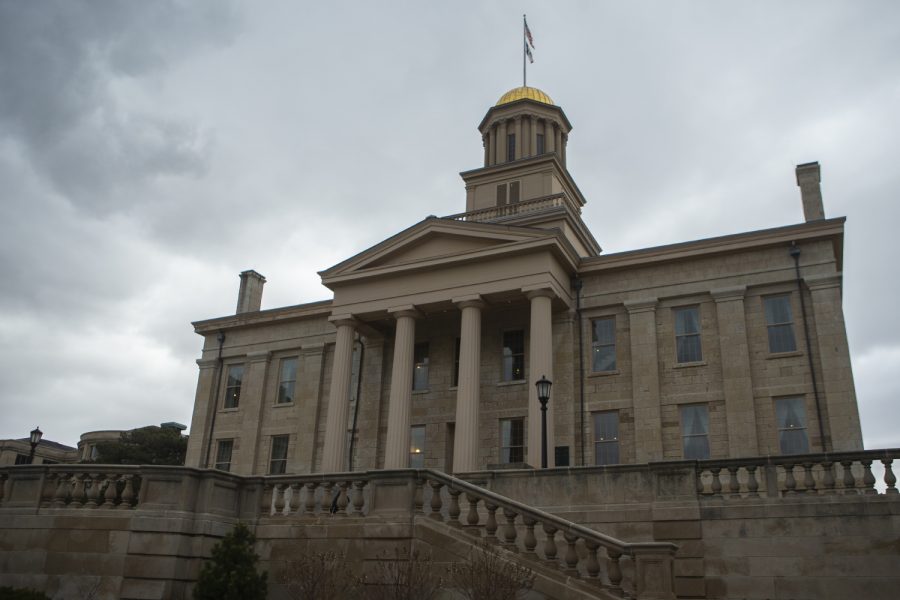Iowa Senate subcommittee advances bill to prohibit tenure at Iowa’s public institutions
During a senate education subcommittee, lawmakers and lobbyists discussed a bill that would prohibit tenure systems at public universities in Iowa.
The Old Capitol is seen on Thursday, March 12, 2020.
February 11, 2021
Iowa lawmakers advanced a bill to prohibit tenure at public universities in a senate subcommittee on Thursday, another step toward becoming law.
Senate File 41 was voted out of the subcommittee just one day after the House education committee advanced the bill. The legislation, introduced by Sen. Brad Zaun, R-Urbandale, would prohibit the establishment or continuation of tenure at community colleges and state Board of Regents’ institutions for employees if passed.
The bill advanced in a three-member committee in 2019, too, but died in committee.
Sens. Jim Carlin, R-Sioux City, and Ken Rozenboom, R-Oskaloosa, cited free speech concerns at regents’ universities as their reason to move the bill forward.
Rozenboom said he is wary of the politicization of higher education and issues on all regents’ campuses in recent years regarding free speech and the role the tenure review process could make in reducing instances of suppression of speech.
Rozenboom thanked Zaun for bringing the bill forward during the meeting, and said this bill was crucial following the University of Iowa’s College of Dentistry email thread that led to the pursuit of potential punishment for student Michael Brase.
“[Brase] got a bunch of responses from people, all anonymous, because they didn’t dare poke their head up, and they said things like ‘it’s scary to speak your mind if your ideology is different from someone who is in a position of power and authority over you,’” he said, reading a response from students who supported Brase. “…’I’m fed up with the one-sided opinions being shoved down our throats.’”
Rozenboom blamed college institutions’ liberal bias for the suppression of conservative views like Brase’s on campuses. As previously reported by The Daily Iowan, Brase did not face a disciplinary hearing after he participated in an email thread at the College of Dentistry.
Carlin agreed with Rozenboom and later discussed a different proposal to direct the regents to conduct a survey on the political affiliations of its employees.
“As of late, there’s been some concern about the politicization of education at our regents [universities],” Carlin said. “I specifically requested a bill to numerically put together the political composition of our regents’ professors. We’d like to have it be somewhat proportionate rather than the wholesale political forced conformity.”
Carlin added that he is concerned about the one-sidedness of higher education in Iowa when it comes to political beliefs. He said he wouldn’t tolerate professors forcing students to conform to their political beliefs.
Sen. Herman C. Quirmbach, D-Ames, disagreed with his colleagues in the committee. He said because of his experience as a formerly tenured professor at Iowa State University, he knows passing this legislation would erode the success of Iowa universities.
“Let me just say very clearly and very precisely from the beginning, there would be no more sure or certain way to destroy our regents’ universities, especially the two research universities, than to pass this legislation,” he said. “The effects would not only be felt at the university, they’d be felt throughout the local and statewide economies.”
Keith Saunders, a lobbyist for the regents and the University of Iowa, and Rachel Boon, the regents’ chief academic officer, both strongly opposed the legislation, addressing the committee via Zoom.
Boon explained the various ways tenured professors could still be terminated, and said tenure is not a lifetime appointment by any means. At the UI, tenured professors undergo annual review and a more thorough review every five years.
She said tenured faculty members undergo reviews after their appointments, and students have multiple opportunities where they can evaluate professors, which is taken into account at annual reviews.
Saunders said if the legislation was passed, it would be one of the most harmful pieces of legislation that affects universities in Iowa.
Tenured faculty bring in $1.2 billion to the state in external funding, he said — something that would be greatly affected if the bill is signed into law.
“These institutions have taken generations to build,” Saunders said. “Quality is something that accumulates over time and can be lost in an instant. A bill like this affects the quality of the institutions.”




